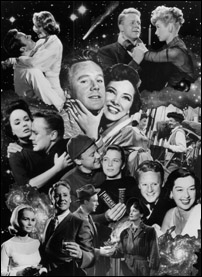
Red-haired, blue-eyed, tall and preternaturally wholesome, the former Broadway chorus boy skyrocketed to fame during the years of World War II, when Hollywood was casting around for replacements for missing stars. (A 1943 car crash that almost decapitated him, and left him with a metal plate in his forehead, exempted him from service.) On the strength of his innocent, all-American charm, and roles in a string of light comedies and dramas, he was mobbed by bobby-soxers wherever he went. In 1945, he was the second biggest box office draw in the nation, behind Bing Crosby.
His big break was in a 1943 war movie called "A Guy Named Joe"—a film that was almost derailed by his auto accident. He is best-remembered today for a series of movie musicals, in which he played opposite some equally all-American female stars, such as June Allyson and Esther Williams. He acted with Judy Garland in "In the Good Old Summertime" (1949) and alongside Gene Kelly and Cyd Charisse in "Brigadoon" (1954).
Mr. Johnson and Kelly knew each other from their Broadway days, when the younger man was the understudy to Kelly's Joey in the 1940 production of Pal Joey. Prior to that, Mr. Johnson, a Rhode Island plumber's son, had taken roles in New Faces of 1936 and Too Many Girls. He would return to the stage in the mid-60s, acting in Come On Strong, On a Clear Day You Can See Forever and Mating Dance. In the 1980s, he played George for a term in the Broadway premiere of La Cage aux Folles.
 |
||
| Vintage Van Johnson |
||
He was born Charles Van Johnson on Aug. 25, 1916, in Newport, RI, and was named for his father, a chilly Swedish-American laborer who raised his son alone after the young boy's alcoholic mother deserted the family.
His marriage to Eve Lynn Abbott (1947-1968) produced a daughter, Schuyler. The two met in an unusual way. Abbott's first husband, Keenan Wynn, was also Mr. Johnson's best friend. After his early car accident, the actor recuperated in the Wynn household. He and Eve fell in love while he was there. Van and Eve married the day after the Wynn's divorce was decreed. The marriage ended in a highly publicized divorce.


Matthew-Murphy.jpg)






